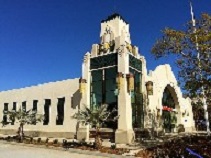IEEE CC Event - AP MEMS Design - 20 April 2022 @ Rusty's
UCSB Professor Sumita Pennathur Talks on Her Micro-ElectroMechanical System Artificial Pancreas Design that Won the $1.625 Million ADA Pathway to Stop Diabetes "Visionary Award" that Helped Fund the AP MEMS Development.

Location - Rusty’s Pizza
5934 Calle Real, Goleta, CA 93117
6:00 PM – Complimentary Pizza, Salad, Beverage
6:25 PM – Central Coast Status
6:30 PM – Professor Pennathur Presents
Greetings, You and guest(s) are invited to join us at Rusty’s on April 20th at 6PM for an exciting talk on the development of an innovative micro-electromechanical system (MEMS} that is incorporated into a patch that is worn on the skin. Professor Sumita Pennathur will talk on the Artificial Pancreas (AP) MEMS she has developed for managing type 1 Diabetes. In addition to being full Professor of ME at UCSB, Dr. Pennathur is CEO of Laxmi Therapeutic Devices where the AP MEMS are being developed. In 2017 Dr. Pennathur received the prestigious “Visionary Award” from the American Diabetes Association (ADA) for her AP MEMS design. The award included $1.625 million to support her research.
Please register yourself and guests below.
Best regards,
Ruth Franklin, IEEE Central, Coast Chair
Date and Time
Location
Hosts
Registration
-
 Add Event to Calendar
Add Event to Calendar
Speakers
 Dr. Sumita Pennathur of UCSB - ME, Laxmi Therapeutic Devices
Dr. Sumita Pennathur of UCSB - ME, Laxmi Therapeutic Devices
MEMS-based innovations for optimized management of Type I diabetes
Achievement of good glucose control in patients with diabetes depends on frequent self-monitoring of blood glucose values and appropriate insulin adjustment and administration. Avoiding such control can result in hypo- and hyperglycemia and life-threatening diabetic ketoacidosis. The most advanced control is achieved by the continuous communication between continuous glucose monitors (CGMs) and insulin pumps for closed loop delivery, typically referred to as an artificial pancreas (AP) system. Although AP systems are nascently entering the marketplace, they all require a separate wearable glucose sensor on the body to achieve closed-loop delivery. Furthermore, every commercial pump and sensor to date measure and deliver within the subcutaneous space (~5mm deep). This is known to have a lag compared to sensing and delivery in the dermal space (~1mm deep), limiting the efficiency of existing AP systems. The ultimate vision is to produce a small footprint, easy-to-use artificial pancreas (AP) system (i.e., integrated CGM and insulin pump) using past accomplishments in both microfluidics and microfabrication, as well as her strong motivation due to Pennathur’s recently diagnosed Type 1 diabetic daughter. This includes both the development of microneedle-based CGM systems to sensing glucose in the dermal space as well as innovative pump mechanisms to achieve insulin dosing within the dermal space that meets specifications of size, power, and performance for facile integration with dermal CGM technology into a small-footprint, wearable patch pump-based AP system. Such innovations represent a major steps towards revolutionizing the management of diabetes.
Biography:
Dr. Pennathur is a full Professor of Mechanical Engineering at the University of California Santa Barbara, with degrees from Stanford (PhD) and MIT (MS, BS).Since arriving at UCSB, Pennathur has contributed significantly to the fields of nanofluidics and interfacial science. She has performed pioneering work in both theoretical and experimental characterization of fluid flow in MEMS and NEMS devices. These contributions have been disseminated in the form of over 60 archived journal publications, books or conference papers, 6 patent applications, and more than 80 invited presentations. Notable awards include the DARPA Young Faculty Award (2008), the UC Regents Junior Faculty Fellowship (2009), the PECASE (Presidential Early Career Award in Science and Engineering) award (2010), the Santa Barbara Chamber of Commerce Innovator of the Quarter Award (2012), and the ADA Pathway to Stop Diabetes Visionary Award (2017). Her work has led her to found many companies - Asta Fluidics, Alveo Technologies and more recently Laxmi Therapeutic Devices where she is currently CEO.
Address:Goleta, United States

